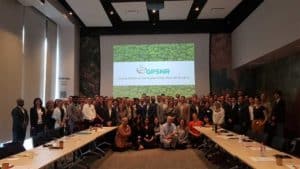In discussing the proposed member requirements and reporting requirements, the Policy Toolbox Working Group has touched frequently upon the topics of High Conservation Value (HCV), no deforestation, no conversion of non-forested ecosystem, and other issues around developments on post-disturbance vegetation/ land cover.
To establish a common understanding about HCVs, the High Conservation Value Resource Network (HCVRN) Secretariat took the initiative to organize a video presentation to the Working Group members on the HCV Approach. The presentation touched on governance and historical aspects of the HCV Approach, and its implementation in forest and non-forest ecosystems in the landscape, concession and smallholder contexts.
(GPSNR Members may view the presentation and download the slide deck by logging in to the website and accessing the Members Version of this article.)





